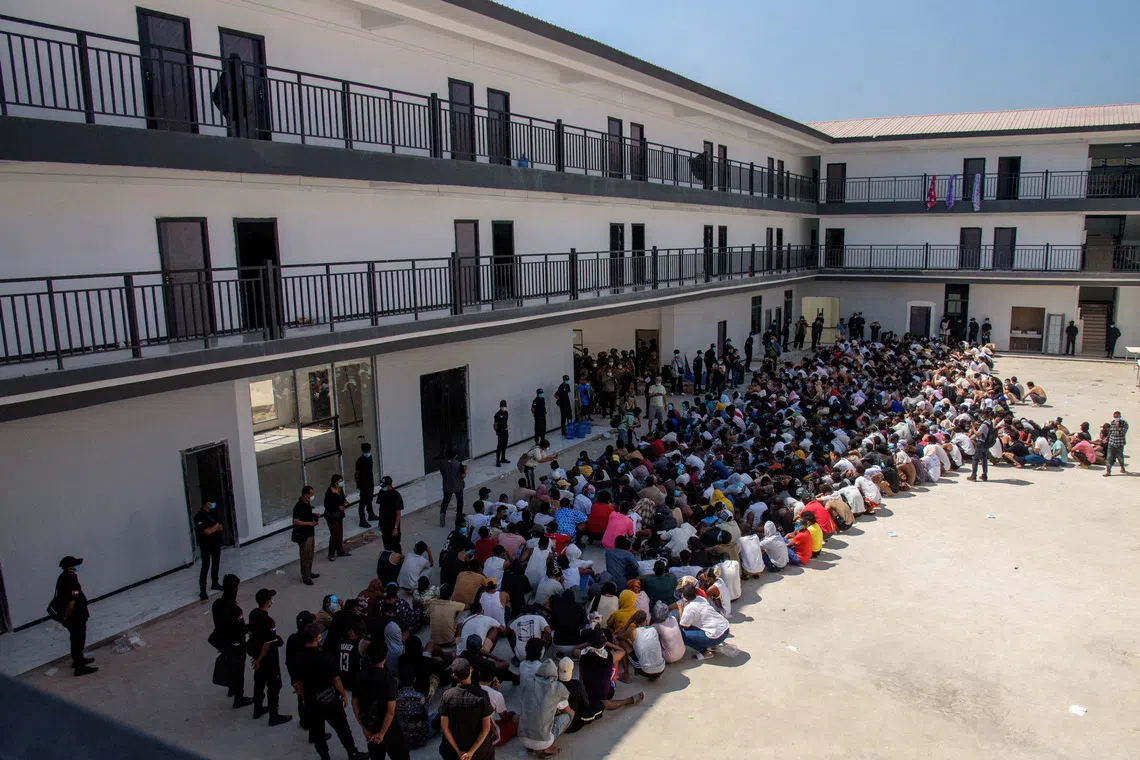Criminal syndicates tapping AI to improve scams, human trafficking: Interpol
Sign up now: Get ST's newsletters delivered to your inbox

Victims of scam centres who were tricked or trafficked into working in Myanmar, stuck in limbo at a compound inside the KK Park, on Feb 26.
PHOTO: REUTERS
SINGAPORE - From chatbots to virtual assistants, artificial intelligence (AI) tools are used by scammers to lure victims, including those who may end up being trafficked to work at scam centres.
These technological advancements have enhanced how scams are being perpetuated, said Ms Stephanie Baroud, a criminal intelligence analyst in Interpol’s human trafficking and smuggling of migrants unit.
In a video interview with The Straits Times on Sept 29, Ms Baroud said that scam syndicates are using AI tools to come up with more convincing ways to dupe people.
These include generating job advertisements that mislead some of these victims, who believe they are applying for a legitimate position, but eventually find themselves forced to work in scam centres in South-east Asia
Typically, advertisements for fake jobs would have several signs that make them suspicious, such as language mistakes or the job’s location matching that of a known human trafficking hub, she said.
AI, however, has made it “harder to discern a fake from a real job ad”.
Ms Baroud added: “We are not even fully aware of how criminals are using AI. This is just scratching the surface.
“It is our assessment that the emergence of AI is likely enhancing and refining traditional human trafficking methodologies, which were already being facilitated by the internet.
“This, in turn, is increasing the complexity and challenges associated with detecting and disrupting these activities for law enforcement agencies.”
Citing recent accounts from such victims, Ms Baroud said many of them reported using free AI tools in their daily tasks at these scam centres to communicate with potential victims in their respective languages, for example.
AI is also used to come up with lines to lower victims’ defences, such as sweet talk in love scams, or attempting to convince people that they are not dealing with scammers.
A few years ago, a scam centre might have needed a Brazilian national to communicate in Portuguese when soliciting potential scam victims who speak only the language, but AI has made this prerequisite redundant, Ms Baroud said.
Despite greater international attention on this issue, many people continue to fall for fake job listings because the factors enabling human trafficking continue to exist, such as a shortage of jobs.
Said Ms Baroud: “You might think, ‘Who is stupid enough to fall for it?’.
“Unfortunately… the lack of employment, the lack of financial means, the desperation that leads these victims to take up job offers that are too good to be true, they’re still there.
“I think sometimes we underestimate the power of an attractive online ad, (especially one) that promises a better job, a better life.”
Yet, the reality could not be more different for these trafficked victims.
For instance, victims are routinely punished if they fail to meet targets, with the punishments differing across scam centres.
In September, Malaysian news outlet The Star reported how scam centres in Myanmar forced “employees” to achieve daily targets of up to US$50,000 (S$64,000)
Those who failed to do so would be tasered or beaten, the report said.
Other punishments include starvation, execution and rape, Ms Baroud said, with female victims in particular possibly being forced into sexual exploitation if they are found to be bad at scamming people.
Recounting her visit at the end of 2024 to a scam compound in the Philippines which had been raided by local authorities earlier in the year, she said the conditions that trafficked victims lived in were “inhumane”.
Interpol had shown the living quarters in a YouTube video put up on Nov 7, 2024, which gave a peek into the organisation’s largest-ever operation against human trafficking and migrant smuggling. In this case, three sets of bunk beds were placed inside a cramped room, with only thin mattresses provided.
Ms Baroud also participated in a raid on a scam centre in Pasay City when she was in the Philippines. Located just beside the World Trade Centre Metro Manila, the centre looked like an office, with a receptionist on hand.
Its workers, however, were hidden away inside a maze, and those who were found with their computer screens still open had numerous tabs and messaging platforms showing multiple ongoing conversations with different scam victims.
In Interpol’s video, about a dozen of them were assigned to one table, with computer screens and other miscellaneous items cluttering their workspace.
Whether these trafficked victims should be treated as victims themselves or as scammers is a difficult line to draw, Ms Baroud said.
“This is their way of surviving. They are there, they need to survive, so they do what they have to do.”




